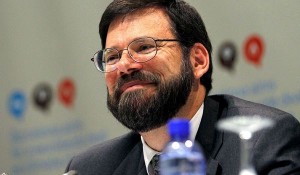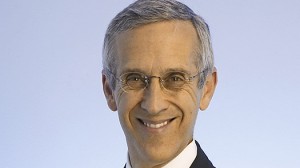Todd Stern and Jonathan Pershing are President Obama’s diplomatic climate change negotiators, charged with representing America’s interests in the tumultuous U.N. global warming negotiations.

They are described by environmentalists, fellow negotiators and former colleagues as smart, pragmatic and occasionally didactic. Nearly all used similar language to describe the tough political and diplomatic obstacle course Stern and Pershing have had to navigate over the past four years.
They were: “constrained” by Congress. “Hands tied” by the domestic policy and “walking a tightrope” between moving the U.N. negotiations ostensibly toward a global treaty while avoiding promises to cut emissions or deliver money that the government cannot keep.

With President Obama winning a second term last Tuesday, activists are hoping for a more productive environment. Now is the time, they insist, for the White House to embrace climate change as a priority, lay the foundation for domestic legislation and prepare the United States to join a treaty that will keep the global average temperature rise below 2 degrees Celsius above preindustrial levels.
“There seems to be a little bit of an opening here,” said Alden Meyer, director of strategy and policy for the Union of Concerned Scientists. He pointed to Superstorm Sandy, New York Mayor Michael Bloomberg’s eleventh-hour presidential endorsement of Obama based on climate change, and Obama’s own victory speech, in which he envisioned an America “that isn’t threatened by the destructive power of a warming planet.”
But Meyer and others said significant action will require Obama to do what he didn’t in his first term: expend political capital.
“I think the question for the White House is, does the president want to make this a legacy issue?” Meyer said. If so, he said, that requires a “major effort” from the administration, starting at the very top.
Starting out with applause
Cheers greeted Stern at his first U.N. climate meeting in 2009 after Secretary of State Hillary Rodham Clinton tapped him to lead the negotiations. “We’re back,” was Stern’s message in those first heady days, along with a promise to “make up for lost time” — specifically, time lost under the George W. Bush administration.
So happy was the United Nations to end the Bush era, in which the Kyoto Protocol was declared “dead” and the very words “climate change” verboten, that, as one developing country diplomat recalled, negotiators applauded Pershing — a scientist who headed the delegation of the World Resources Institute before joining the U.S. team as Stern’s deputy — as he walked into a meeting hall.
“I remember Jonathan being applauded as he came in. It wasn’t even a COP [Conference of the Parties to the U.N. Framework Convention on Climate Change],” the diplomat said. “Then things started to get difficult. Not in the first moment. In the first moment, it was positive.”
Things soured quickly, from the perspective of European countries and developing nations. The United States put forward an emissions pledge most considered too weak. Meanwhile, the realization that carbon cap-and-trade legislation was simply not going to pass the U.S. Senate slowly snowballed through the international consciousness.
Still, the United States promised to cut carbon 17 percent below 2005 levels this decade. All the while, Stern and Pershing insisted China and other emerging countries be held to the same legal terms as industrialized ones — a massive change from the status quo under Kyoto in which only wealthy countries were expected to act on climate change. They also pushed for what would become equally controversial: voluntary targets rather than legally binding ones.
The frenzy of 2009 culminated at the climate summit in Copenhagen, Denmark, where, instead of developing a new global treaty as many hoped, Obama, Chinese Premier Wen Jiabao and a handful of other world leaders worked through the night to cut a deal.
Through the eyes of many American analysts, the Copenhagen Accord that emerged that night — recording emissions pledges of every major emitter — was a success for which the U.S. negotiating team and Obama himself deserve credit.
“I don’t think China would have inscribed anything on mitigation if not for the personal intervention of the president,” said Joe Aldy, an assistant professor of public policy at the Harvard Kennedy School and a longtime White House aide who served as special assistant to the president for energy during Copenhagen.
Others agreed that the United States deserves credit for heralding a new era in getting other major emitters to pledge carbon cuts, though some also noted that countries were headed in that direction. One European diplomat conceded, “I don’t think the E.U. alone would have been able to pull that off.” And a former major emerging nation negotiator whose country made a Copenhagen pledge said, “It certainly helped to have U.S. pressure.”
Said Andrew Light, a senior fellow at the Center for American Progress, “They basically got the world to create what I think is a very good Plan B in the short term when it was clear that we weren’t going to get a new Kyoto-style agreement out of Copenhagen.”
‘They acted just like Bush’
For many developing nations, though, Obama’s failure in Copenhagen to deliver a treaty with a top-down target aimed at averting catastrophic warming to which all nations would be legally bound remains a bitter pill. Ensuing years, in which the United States made heavy demands on developing countries but made no move to show how it planned to meet its own target, rankled even more.
“I started out extremely hopeful that Obama would make a big change, and until the last minute in Copenhagen, I was expecting him to come up with something brilliant. But I was very, very disappointed. And since then, I’ve seen the Obama administration retrench,” said Saleem Huq, a senior fellow at the U.K.-based International Institute for Environment and Development.
“In some ways it’s almost as bad, if not worse, than the Bush administration, in the sense that the Obama people get it,” Huq said, noting several scientists in the administration. “We all think of Obama and the Democrats as the good guys, but in the negotiations, they acted just like Bush. The only difference was that it was harder to criticize them than it was to criticize Bush.”
The “no different from Bush” assessment doesn’t just come from across the ocean. One former U.S. climate negotiator made similar, albeit kinder comparisons, insisting that unlike Bush, the Obama team sincerely cares about climate change and has been far more inclusive internationally. Still, the diplomat said, “The irony is that it doesn’t actually translate into significant differences in policy.”
Others bristle at the comparison. They point to the 54.5 mpg fuel efficiency standards, billions of dollars in stimulus spending toward renewable energy and pending EPA rules addressing climate change and industrial pollution. At the multilateral level, American activists defend the administration as successfully finding an imperfect but robust way to curb carbon under the weight of knowing Congress had rejected before and would reject again any treaty that did not put China on an equal footing to the United States.
“If you compare this to the Bush administration and even to the Clinton administration, what they’ve done is way more proactive in the international negotiating scene,” said Jake Schmidt, international policy director for the Natural Resources Defense Council.
Neither James Connaughton, Bush’s Council on Environmental Quality adviser, nor his U.N. climate envoy, Harlan Watson, could be reached for comment. But other Republicans said the comparison between the Bush and Obama team goals before the United Nations were not far off.
“They acted fairly conservatively once they realized they weren’t going to get any carbon legislation out of Congress. I don’t think they played it very differently than, say, Harlan Watson did,” said George “Dave” Banks, who served a senior adviser on international environmental affairs under Bush. He added, “It doesn’t matter who is in the White House. It always comes down to national circumstances.”
Creating opportunities at Doha?
As Stern and Pershing prepare to attend their fourth and perhaps last U.N. Conference of the Parties later this month in Doha, Qatar, they have developed both personal friendships and a few animosities.
Stern, observers say, is low-key but can be undiplomatic and blunt. Yet he has built up a warm relationship with Chinese delegation leader Xie Zhenhua — even taking him to a Cubs game while meeting in Chicago in September, according to Aldy. Pershing, meanwhile, is widely described as brilliant — yet several diplomats said he has rubbed many counterparts the wrong way, coming across as a lecturer more concerned with winning an argument than finding common ground.
Environmentalists once enamored with the team are now openly bitter. But many say they hope Obama’s second term will breathe new life into the talks.
The looming question, though, is the end goal. Does the Obama team want a legally binding treaty?
Analysts and leaders close to the administration say the long sought-after goal of a global treaty to replace Kyoto might be dead. Or at least irrelevant.
“We’re too hung up on the negotiations in a traditional way. We’re too hung up on the traditional framework of the negotiations,” said Tim Wirth, president of the U.N. Foundation and a former State Department undersecretary for global affairs.
“I think the administration has been helpful in moving away from the idea of a single framework toward what is now popularly called the building block approach,” Wirth said, citing energy efficiency, building standards, renewable energy and clean cookstoves. “If I were Todd Stern and the administration, I would try to get the world to develop as many common standards as they could.”
Light, at the Center for American Progress, said from his point of view, it’s going to be the administration’s job to prove that the “bottom up” approach can actually achieve the needed global emission reductions. He thinks it is doable. “They’ve got a theory that I think has proven more useful than what many critics say, in terms of getting countries to articulate their ambition and the conditions upon which they would increase their ambition,” Light said.
Environmental activists who have fought for more than 20 years for a global treaty say they’re not willing to give up the quest. Meyer, for one, said the goal of keeping global temperature rise below 2 degrees Celsius cannot be achieved by voluntary measures. Regardless, though, he insisted that if the Obama administration intends to abandon the goal of a legally binding treaty, its negotiators need to say so publicly and clearly.
By Lisa Friedman, Deputy Editor, ClimateWire
Reproduced with permission, copyright 2012, E&E Publishing LLC. www.ClimateWire.com
